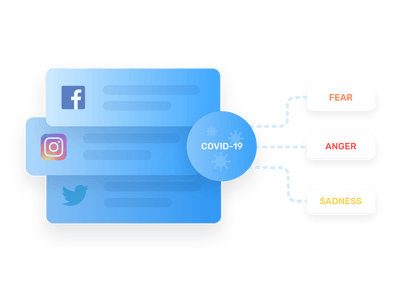About ADAPT Centre
ADAPT Centre is the world-leading SFI (Science Foundation Ireland) research center for new technologies in digital communication. They aim to improve communications and connections, from person to person – and between organizations and people, by making it easier for everyone to access and understand video, text, speech, and image data “in a natural way across languages and devices.”
The story
ADAPT Centre set out to identify the psychological impact of COVID-19 on Irish citizens. The goal was to understand the most negative feelings surrounding the pandemic and use these insights to design surveys that could, ultimately, help policy-makers and health professionals define informed strategies to mitigate a national spike in serious mental health issues.
Using anonymous social listening across Twitter, Facebook, and Instagram accounts throughout Ireland, ADAPT sought to identify changes in mental health – indicated by word use in relation to mentions of COVID-19. At the core of this first process, they were looking for the most influential negative sentiments that they would then use to design a survey – targeting each factor, individually.
For example, if one of the negative factors is “fear,” they could then find “risk factors” or keywords that represent fear and use them in the survey questions to target that specific sentiment. This helped the research center understand how people were psychologically coping with the pandemic so that they could design better surveys.
The Challenge
While many of the researchers at ADAPT have years of experience with data science, AI, and machine learning, for this study they were working with psychologists with little to no experience in those fields.
The first phase of the study included gathering thousands of tweets and Facebook and Instagram posts, identifying features within them that signaled changes in mental health, and annotating them with psychological features that would be used to train machine learning models.
A fast and scalable solution as this was a timely study with results needed in days and weeks, rather than months and years.
Easy-to-use machine learning software with a simple UI that psychologists could easily understand to train models and annotate data.
Quick implementation so they could get started straight away.
Results
ADAPT built a machine learning model for large-scale risk factor analysis using MonkeyLearn’s platform. They annotated approximately 10,000 tweets and posts to train the model, tested 30,000 social media feeds, and built two MonkeyLearn models in four weeks.
They first built a custom COVID-19 Emotions Classifier that could recognize psychological features: anger, fear, loneliness, stress, sadness, etc.:

To build this model, ADAPT identified posts related to COVID-19 using keyword extraction and then performed sentiment analysis to identify the most negative feelings related to the pandemic.
To train the model and perform analysis, they used batch processing to upload a CSV file with thousands of comments in a single go, saving time and streamlining procedures.

The goal of the second phase was to examine the features or topics related to each of the negative sentiments, like financial problems, poor health, social isolation, etc. Both phases used the same training dataset with different “topic tags” defined by the team of psychologists.
Finally, ADAPT used the insights from this analysis to design survey questions that covered the most relevant topics and mental health issues in Ireland during the coronavirus outbreak.
Testimonial
“MonkeyLearn has provided a very neat and user-friendly platform that enabled us to examine the data in a unified workflow as a team. Different team members with different backgrounds, from psychologists to AI experts, managed to use MonkeyLearn which provided us with a unique platform for successful integration of machine learning methods in our project.
From the technical perspective, MonkeyLearn’s on-the-fly training and learning strategy has significantly helped us expedite our progress. This feature allowed us to train and annotate simultaneously and as a result, after a number of annotations, we were able to predict the tags in our training set which was very helpful to annotate the rest of the data.”

Dr. Hossein Javidnia
Research Fellow atho ADAPT Centre




